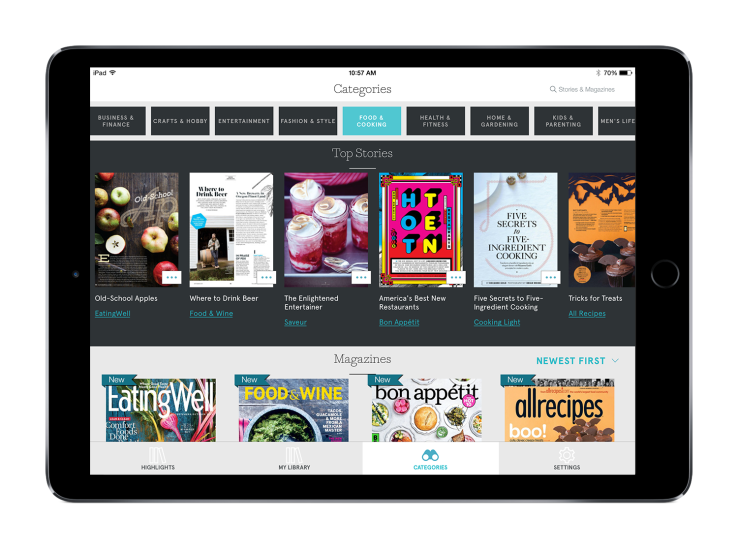
As the debate continues over fake news and the role that aggregators like Facebook have played in spreading it, Apple is making an acquisition that could help it lay out a position as a purveyor of trusted information. The iPhone maker is buying Texture, a magazine that’s known as the “Netflix of magazine publishing” that gives readers access to around 200 magazines for a monthly fee of $9.99.
“We’re excited Texture will join Apple, along with an impressive catalog of magazines from many of the world’s leading publishers,” said Eddy Cue, Apple’s senior vice president of Internet Software & Services, in a statement. “We are committed to quality journalism from trusted sources and allowing magazines to keep producing beautifully designed and engaging stories for users.”
From what we understand, for Texture — formerly known as Next Issue — will continue to operate as is with no changes — meaning that it will continue to offer apps for iOS, Android, Amazon Kindle Fire and Windows 8 and 10. Apple is acquiring the full company, including employees, and the deal is expected to close very soon.
“I’m thrilled that Next Issue Media, and its award-winning Texture app, are being acquired by Apple,” said John Loughlin, CEO of Next Issue Media / Texture, in a statement. “The Texture team and its current owners, Condé Nast, Hearst, Meredith, Rogers Media and KKR, could not be more pleased or excited with this development. We could not imagine a better home or future for the service.”
Financial terms of this deal are not being revealed, and Texture has never disclosed its valuation.
Before it rebranded in 2015, Texture was originally founded as Next Issue Media as a joint venture between Condé Nast, Hearst, Meredith, News Corp., Rogers Communications, and Time Inc. The company, it appears, has raised at least $90 million — $40 million from the publishers, and an additional $50 million from KKR and other investors that include BuzzFeed, Vox Media and Imgur.
Texture, and before it Next Issue, has been around since 2010. It was launched at a time when a number of other “digital newsstands: were hitting the market. Tapping into the new popularity of apps and the belief that these would become the primary way that consumers would read newspapers and magazines, publishers also believed that this could be a key way for them to better monetise their content, after missing the boat both on paywalls for online content and reaping large benefits from online ads, areas where large aggregators like Google largely reaped the rewards.
It’s not clear how many users Texture had. An article from 2014 estimated the number at 150,000, while this story from 2016 noted it was in the “several hundreds of thousands” with 50 percent growth expected in the coming years.
Nor is it clear what Apple intends to do with Texture longer term. One area where we could see the product end up is Apple News, where Apple already provides access to a variety of third-party content. More generally, the company has been focusing on a larger premium content play across other mediums, putting a lot of investment into music, video and podcasts. Texture fills out the scope of that vision with reading material.
It’s also in a sense table stakes for companies like Apple. Amazon launched its own subscription services last year, and Google of course also offers a newsstand of sorts via Google Play.
Featured Image: Texture


